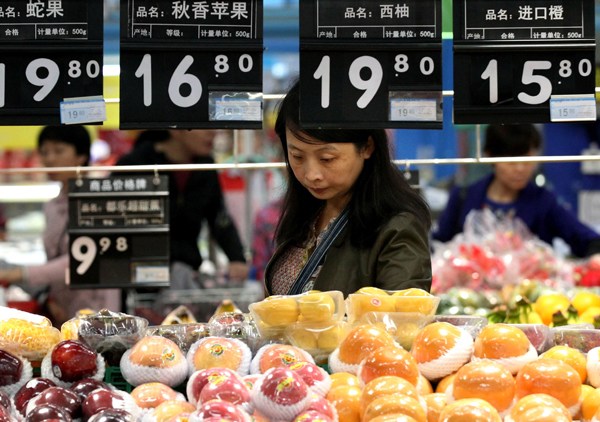
Rising food prices in China pushed consumer inflation to a higher-than-expected 1.9 percent in September. Last month, food prices rose by 3.2 percent year-on-year. (Photo:China Daily/Zhu Xingxin)
Better than expected economic figures released on Friday eased concerns about hitting the annual growth target, but more efforts are needed to to sustain growth momentum in the long term, economist say.
"The uptick of PPI and CPI in September provide good news for near term growth," said Yin Jianfeng, chief economist with China Zheshang Bank, during a panel discussion on the sidelines of the Zheshang Caijing International Forum on Friday.
The nation's producer price index (PPI) and consumer price index (CPI) figures for September are strong, official data shows.
The producer price index, a gauge for factory-gate prices, rose by 0.1 percent year-on-year in September, which is the first increase in nearly five years.
The consumer price index, which measures consumer price inflation, came in at 1.9 percent in September, above market expectations.
"But recent uptick figures are not enough to herald the recovery of economy," Yin said, "many problems within in the economy have yet to see major improvements—deleveraging process should be among top key tasks."
He said despite the nation's debt ratios not yet reaching the levels that would spark a crisis, "the pace of its increase is quite noteworthy".
Household debt levels have surged at a fast speed in recent years, which is a similar situation to what the United States experienced before its 2008 submortgage crisis, according to Yin. "Demand for home purchases rises sharply amid low-income households in recent years, but they have relatively lower abilities to cope with and recover from an income shock, compared to high or medium income households," he said.
UBS estimates that the loan to value ratio in China, which reflects the demand for housing, has risen to nearly 70 percent from 15 percent in 2012.
"A flood of defaults may trigger a crisis when a large proportion of credits flood to low income households," Yin said.
Yin said the risks brought by mounting household debt could be more alarming compared to that of the cooperate debt level.
"The cooperates might be more easier and would take less time for the government to control, compared to households," he said.


















































